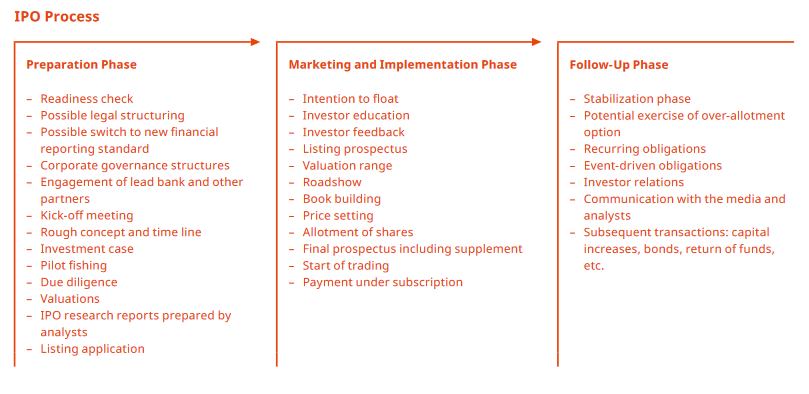Would you like to invest your money? Get in touch with an expert:
What is Initial Public Offering (IPO)?
The Initial Public Offering (IPO) is the process by which shares are issued for the first time. For the first time, shares are admitted to a stock exchange and offered publicly on the organized capital market. IPOs provide the company with the opportunity to raise capital from investors on the public capital market. Existing shareholders usually receive a share premium when a company transitions from a private to a listed company.
Until the IPO, the company is a private company. It is not possible to purchase shares of the company on the public market. The number of shareholders in a private company is typically small. In most cases, the shareholders are the founders, members of their families, or friends. There may also be professional investors involved. Money is necessary for the growth of a company. A public offering is one method of raising external funds. Additionally, because a listed company must be transparent, outside capital can be raised more easily.
In order for a company to go public, its shares must be priced. The banks that accompany the IPO determine the price during the due diligence process. Immediately following the company's public offering, existing shares are valued at the newly public share price by means of stock exchange trading (supply and demand). Shareholders are now able to keep their shares or sell them on the stock exchange, often at a profit, since IPOs are usually accompanied by a share premium.
A typical IPO process consists of three phases. As a first step, it requires preparation. Afterward, the marketing and implementation phases will take place. Finally, there is a follow-up phase.
Source: Swiss Exchange - IPO Guide Switzerland
Reasons for Launching an IPO
There are several objectives that can be achieved through an IPO. The following are three possible objectives:
Financing
Financing is usually positively affected by an IPO. In order to generate organic growth, the additional equity can be invested. It is also possible to use the capital for external growth, i.e. acquisitions. Reducing debt capital can also contribute to the strengthening of the equity ratio under certain circumstances.
Structure of Ownership
A second motive is the desire to change the ownership structure of the company. The company must raise capital elsewhere if, for example, a major investor leaves the company. As a result, an IPO can serve as an exit strategy for financial investors, for example, and also provide a way to broaden the shareholder base. An IPO can also allow stakeholders to participate in the company more easily.
Awareness Level
Thirdly, the brand awareness level and governance may play a role. A company's profile may be enhanced by an IPO. Following the IPO, the company is subject to disclosure requirements. As a result, transparency is increased and efficiency is improved. Furthermore, after an IPO, companies are more likely to be included in research by bank analysts, which also increases transparency and awareness.
In most cases, the prospectus for the listing describes the intended use of the new equity. Switzerland's most frequently cited purposes for using funds are organic growth, external growth, debt reduction, and general business financing.
Advantages of an IPO
- Raising capital
- Through shareholding plans, better managers and qualified employees can be attracted and retained.
- Investment opportunities on the public capital market facilitate acquisitions and increase awareness and prestige. As a result, sales can be positively affected.
- Credit terms may be more favorable if there is greater transparency (through mandatory reporting).
Disadvantages of an IPO
- IPOs are expensive.
- The costs associated with maintaining the listed company
- Management must devote more time, effort, and attention to reporting.
- Competitors may benefit from the disclosure of information.
- It may be difficult to find good managers, who are willing to take risks under strict management and control by the board.
IPO Alternatives
Direct Listing
Direct listing of an IPO is conducted without the involvement of an underwriter. By eliminating the underwriting process, a direct listing increases the risk for the issuer, if the offering does not succeed. Direct offerings are usually limited to companies with well-known brands and attractive business segments.
Dutch Auction
In a Dutch auction, the IPO price is not fixed. In this auction, potential buyers can bid on the shares they wish to purchase as well as the price they are willing to pay. Shares are then allocated to bidders who have offered the highest price.
Would you like to invest your money?
Speak to an expert.
Your first appointment is free of charge.




